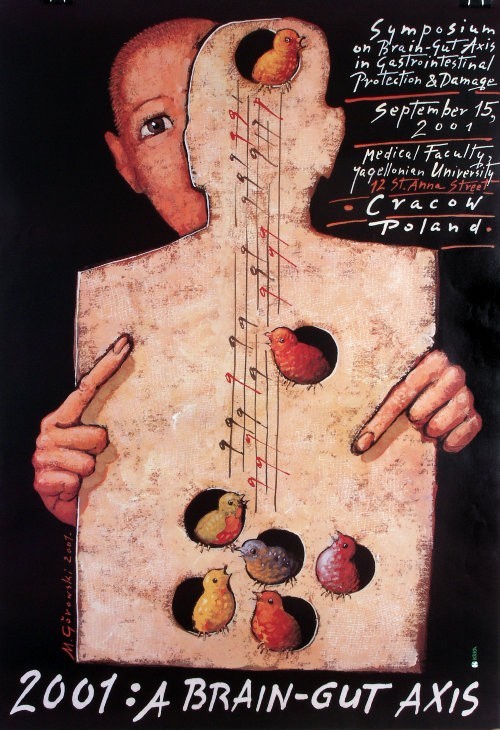This post has been updated.
This is one of those straightforward posts I sometimes do when I come across information that I feel is important to share. It will involve factoids and a list. You’ve been warned! Basically I’m going to outline some interesting stuff that explain why problems with your gut are causing the mood and energy issues you might be having.
What’s a leaky gut?
You have a barrier protecting your abdominal wall. When this barrier is weakened (it quite literally gets holes in it, ergo the “leaky” descriptor), it reacts to external toxins – peptides from gluten and dairy and antibodies we make to food or infections or bugs. The cytokines that this triggers then enter our body and wreck havoc.
How does it get leaky?
Your abdominal wall can get weakened (leaky) from:
- a crappy diet high in sugar and low in fibre
- nutritional deficiencies of zinc and omega-3 fats
- overuse of antibiotics and hormones
- environmental toxins
- massive stress
How’s the gut linked to the brain?
Both the gut and brain originate early in embryogenesis from the same clump of tissue, which divides during fetal development. One section turns into the central nervous system, and the other becomes the enteric nervous system (the gut’s brain – our second brain – so to speak).
Stay with me now!
These two nervous systems later connect via a cable called the vagus nerve – the longest of all the cranial nerves. Vegus means “wandering” and it meanders (all across your torso) from the brain stem, through the neck, and finally ends up in the abdomen.
The gut has a brain? Let’s unpack this a little.
- the gut’s brain is located in sheaths of tissue lining the esophagus, stomach, small intestine and colon.
- the gut brain contains some 100 million neurons, more than in the spinal cord or the peripheral nervous system.
- it’s packed with neurons, neurotransmitters and proteins that send messages between neurons or support cells like those found in the brain.
- it contains a complex circuitry that enables it to act independently, learn, remember and produce gut feelings.
- one hundred million neurotransmitters line the length of the gut, approximately the same number found in the brain.
- nearly every chemical that controls the brain in the head has been identified in the gut, including hormones and neurotransmitters.
- equipped with its own reflexes and senses, the second brain can control gut behavior independently of the brain. While the central nervous system is needed for swallowing and for defecation, from the time the food is swallowed to the moment it’s remains are expelled from the anus, the gut is in charge.
This bit you need to know in case you skimmed the bit above: the gut brain is very similar to our head brain in complexity and function.
So is this why a crook gut makes us cranky?
Yep! Foods, pollen, chemicals, dust etc can cause inflammatory reactions in our skin, lungs, digestive system…which can make us cough, give us hives, or diarrhea. But allergies also create a host of ‘mental’ symptoms… fatigue, brain fog, slowed thought processes, agitation, aggressive behavior, anxiety and depression and there have been links made between gut-related allergies and mental disordersincluding schizophrenia, bipolar, hyperactivity, autism, learning disabilities, and even dementia.
The crankiness (or not) of your gut will certainly impact your neurological and psychological health. Ninety percent of the fibres in the vagus nerve carry information FROM the gut to the brain – not the other way around.
Here’s how just a few things are affected:
- emotions. A large part of our emotions are influenced by the nerves in our gut. ‘Butterflies in the stomach’ is a signaling in the gut as part of our physiological stress response. Gastrointestinal (GI) turmoil can sour our moods, and everyday emotional well-being certainly relies on messages from the gut brain to the brain above.
- sleep. The brain and gut are so much alike that during our sleeping hours, both have natural 90-minute cycles. For the brain, this slow wave sleep is interrupted by periods of rapid eye movement sleep in which dreams occur. For the gut, the 90-minute cycles also involve slow waves of muscle contractions but, as with REM intervals, these are punctuated by short bursts of rapid muscle movement. The two affect each other – people with bowel problems (IBS etc) tend to have abnormal REM sleep.
So, you take antidepressants…
Well, you might also be reporting gut issues, too? IBS, perhaps?
Most antidepressants are serotonin reuptake inhibitors – they prevent uptake of serotonin by cells to enable the depressed person to have more serotonin in the brain. BUT, it also means less is available for use by the cells of the gastrointestinal tract.
Problem is, serotonin calms the gut, too, and also helps peristaltic and secretory reflexes. (95 percent of the body’s serotonin is found in the bowels). So long-term use or the wrong dosage can cause nausea, vomiting, constipation and diarrhea, and – ironically – anxiety, insomnia, and fluctuations in appetite.
Or depression of the gut brain.
PS: Irritable bowel syndrome (IBS) also arises from too much serotonin in our guts, and could perhaps be regarded as a “mental illness” of the second brain.
Which would suggest getting our guts sorted might be the anti-anxiety salve we seek?
It certainly does. Personally, I have lots of issues with my gut. It’s part of the AI condition I have, and also a result of the high anxiety I’ve carried with me since childhood.
What do I do?
Here’s a rundown of my gut protocals: here and here.
I also ferment my vegetables, and make my own sprouts. I’ve researched this and I feel this is a far better way to get probiotics into my system than store-bought tablets.
What about you? Any tricks?


